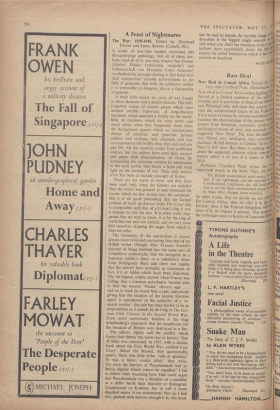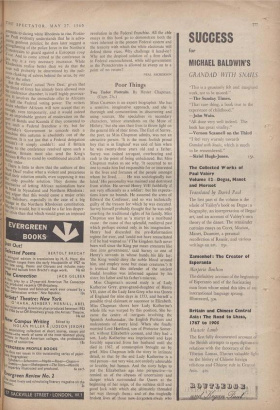Raw Deal
New Deal in Central Africa. Edited by Leys and Cranford Pratt. (Heinemann,' New Deal in Central Africa utters fighting .0°to, Aimed at a limited audience of the Pollit„ii minded, and in particular at those from Rh°""it. and Whitehall who will meet this autumn I°, view the constitutional future of the Federalrro it is a series of essays by various contributors examine the shortcomings of the present Fe4_,i system from historical, economic, politicaLri sociological points of view, and conclude ‘vtli suggested 'New Deal.' The tone througho, very liberal, very intelligent, very conceal; maintain British honour in Central Africa ‘ there is still time. But there is nothing dellvis o about the suggested solution, which, whetheto writers admit it or not, is a resort to the Stick.
Professor ssor Cranford Pratt writes the important words in the book. They are lb; The British Government must make it etti that if no agreement can be reached at 4 Constitutional Conference she will hold he_.,11'11 free to use her final constitutional power VP' to make what changes seem essential. In other words, first we decide on our solliti° for Central Africa; then we offer it to the hat ference; then, if the Federal delegation will ,P-e, none of it, we impose it anyway. This teclunclse the technique used on Kenya at Lancaster 1-1°°, bj amounts to daring white Rhodesia to rise. Profes- sor Pratt evidently understands that he is advo- cating gunboat politics; he does later suggest a strengthening of the police force in the Northern ( 1",rotectorates to guard against a European coup this way And to come armed to the conference in ,is waY is a very necessary insurance. White Rhodesians realise better than we do that the issue will probably be determined by the judi- cious clanking of sabres behind the arras, by one *le or the other. But the editors' actual 'New Deal,' given that tlitle threat of force has already been allowed into iii ii[1: Conference chamber, is itself highly provoca- e. It involves the immediate offer to Africans of al half the Federal voting power. The writers 11' enough, whether Africans will now accept that as nugh, even temporarily, and it would indeed be an improbable gesture of moderation on the Part of
Banda and Kaunda if they consented to give such a Federal franchise a try, but for
elensky's Government to concede such a franchise this autumn is absolutely out of the (1„uestion. It is not just that a Federal delegation comes simply couldn't: and if Britain nlcan Rifles to the conference resolved upon such a solution tri Britain must also send the King's fles to stand by southbound aircraft in battle order, : here is little to show that the authors of this T New Deal' realise what a violent and precarious .4bretiff their solution entails, even supposing it was Only .possible solution. They dismiss the zternative of letting African nationalism have head in Ny thasaland and Northern Rhodesia : kith argue that this would cause a major crisis sill) Salisbury, especially in the case of a big ;mange in the Northern Rhodesian constitution.
aYbe it would, but it would be a far less desper-
e crisis than that which would greet an imposed revolution in the Federal franchise. All the able essays in this book go to demonstrate both the vices inherent in the present Federal system and the tenacity with which the white electorate will defend those vices. Why challenge it head-on? Why not the despised solution of a firm check to Federal encroachment, while self-government in the Protectorates is allowed to sweep on to a point of no return?
NEAL ASCHERSON







































 Previous page
Previous page